Neurology / Neuroscience Technologist
Entry Level Qualification
Graduate
Career Fields
Medical Services
For Specially Abled






Career Entrance Exam
About Career
PARTICULARS | DESCRIPTION |
Name | Neurology / Neuroscience Technologist |
Purpose | Support Neurological Diagnosis |
Career Field | Allied & Para Medical Science |
Required Entrance Exam | NEET UG, NEET PG, AIIMS PG INICET |
Average Salary | 150000 - 300000 Rs. Per Year |
Companies For You | Neurodiagnostic Centers, Neurology Departments & Many More |
Who is Eligible | Class 12th Pass |
1. Neurology/ Neuroscience Technologists are specialized healthcare professionals who manage and operate the biomedical equipment used in the diagnosis and treatment of various diseases and disorders of the central nervous system which consists of the brain, spinal cord, and various types of nerves.
2. They are responsible for selecting, assembling, cleaning, disinfecting, setting up as well as testing laboratory biomedical equipment and machines as well as making minor repairs to ensure proper operation and that they are functioning according to specifications.
3. They have specialized patient-appropriate interpersonal skills to explain testing procedures to the patient and obtain her cooperation for the best performance of these procedures. They also check a patient’s special needs since in most neurological or related ailments, individualistic & personalized care is appropriate.
Key Roles and Responsibilities
1. You will take complete histories directly from patients or medical records, record patient identification, and/or prior test results.
2. You will explain testing procedures to the patient and obtain her cooperation for the best performance of these procedures. You will also check the patient’s special needs.
3. You will measure & apply electrodes using standard principles and understand the basic troubleshooting of various equipment.
4. You will write preliminary technical reports with assistance and fill statutory and equipment databases with pertinent patient & test information, findings or data.
5. You will analyze the results of tests or experiments to ensure conformity to specifications, using special mechanical or electrical devices.
6. You will prepare standard volumetric solutions or reagents to be combined with samples, following standardized formulas or experimental procedures.
7. You will consult with a Neurologist/ Surgeon to determine a final diagnosis when abnormal cells are found.
8. You will be involved in selecting, assembling, cleaning, disinfecting, setting up as well as testing laboratory equipment and machines as well as making minor repairs to ensure proper operation and that they are functioning according to specifications.
9. You will have to demonstrate knowledge of the central nervous system, diseases related to neuro-diagnostic medicine, instrumentation, basic electronics, and electrical safety.
10. You will demonstrate positive patient-appropriate interpersonal skills with patients, physician staff, and other hospital/clinic staff members.
11. You will acquire specialized skills to perform more difficult procedures and other neuro-diagnostic procedures including intraoperative monitoring, testing, computer set up, and the clipping, pruning, & archiving of data.
12. You will continue education by participating in or through conferences & technical meetings, journal workshops, seminars, and site visits. You may as well participate in and take on individual research projects.
Career Entry Pathway
Class 10 with any subjects, Science and Mathematics – Class 11-12 in Science stream with Physics, Chemistry and Biology - B Sc in Neuro Electrophysiology/ Physician Assistant/ Paramedical Technology (Neuro Technician) or similar.
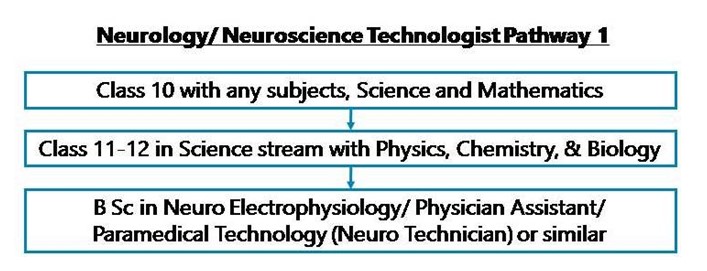
After completing Class 11-12 in Science stream with Physics, Chemistry and Biology as mandatory subjects, you may go for a B Sc in Neuro Electrophysiology/ Physician Assistant/ Paramedical Technology (Neuro Technician) or similar programs in this discipline.
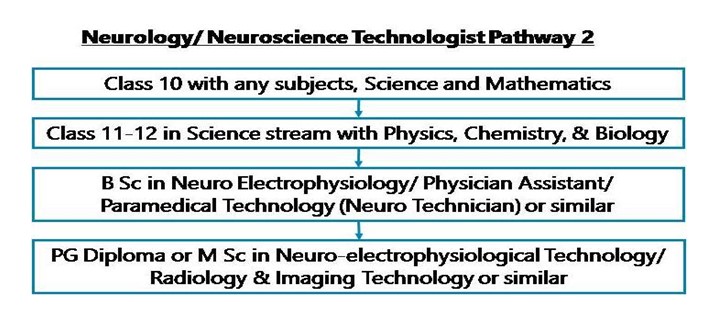
After completing Class 11-12 in Science stream with Physics, Chemistry and Biology as mandatory subjects, you may go for a B Sc in Neuro Electrophysiology/ Medical Laboratory Technology / Instrumentation Science/ Physician Assistant/ Paramedical Technology (Neuro Technician) or similar. Thereafter, you may choose to pursue a PG Diploma or M Sc in Neuro-electrophysiological Technology/ Radiology & Imaging Technology or similar programs in related disciplines. If you go for an M Sc, you will have an option to continue further and complete your doctoral studies (PhD). However, with a PG Diploma after graduation, a subsequent PhD is not possible.
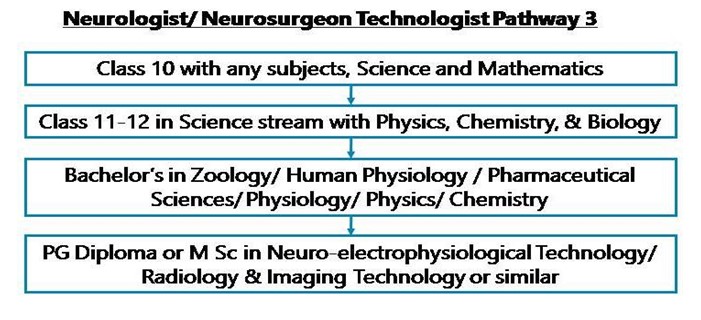
After completing Class 11-12 in Science stream with Physics, Chemistry and Biology as mandatory subjects, you may go for a Bachelor’s in Zoology/ Human Physiology / Pharmaceutical Sciences/ Physiology/ Physics/ Chemistry.Then go for a PG Diploma or M Sc in Neuro-electrophysiological Technology/ Radiology & Imaging Technology or similar programs in related disciplines. Such M Sc programs for graduates from other streams are offered by limited colleges only.Hence, it is advisable to complete a Diploma course in this discipline before specializing with an M Sc. After M Sc, you will have an option to continue further and complete your doctoral studies (PhD) too.
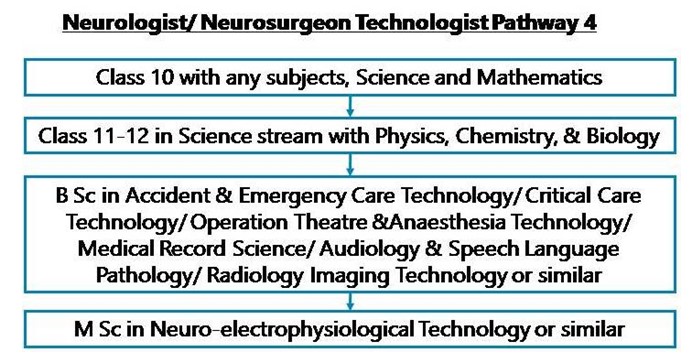
After completing Class 11-12 in Science stream with Physics, Chemistry, and Biology, you may go for a B Sc in Accident & Emergency Care Technology/ Critical Care Technology/ Operation Theatre &Anaesthesia Technology/ Medical Record Science/ Audiology & Speech-Language Pathology/ Radiology Imaging Technology or similar. Then you may go for an M Sc in Neuro-electrophysiological Technology or similar programs in related disciplines.
Required Qualification & Competencies
After Class 11-12,you may pursue:
1. B.Sc. in Neuro Electrophysiology/ Physician Assistant/ Paramedical Technology (Neuro Technician) or similar
2. Bachelor’s in Zoology/ Human Physiology / Pharmaceutical Sciences/ Physiology/ Physics/ Chemistry.
MINIMUM EDUCATION REQUIRED | MAXIMUM EDUCATION REQUIRED |
Under Graduate Undergraduate Degree / Honours Diploma / Graduate Diploma (equivalent to a Degree) Programs for which the minimum eligibility is a pass in Higher Secondary / Class XII School Leaving examination. | Post Graduate Postgraduate Degree / Diploma / Certificate Programs for which the minimum eligibility is a pass in Graduation / equivalent Diploma program like Honours Diploma or Graduate Diploma. |
Competencies Required
Interest
1. Realistic: You should have interests for Realistic Occupations. Realistic occupations involve more practical and hands-on activities than paperwork or office work. Realistic occupations often involve physical activities for getting things done using various tools and equipment.
2. Conventional: You should have interests for Conventional Occupations. Conventional occupations involve repetitive and routine tasks as well as fixed processes or procedures for getting things done. These occupations involve working more with data, systems, and procedures and less with ideas or creativity.
3. Social: You should have interests for Social Occupations. Social occupations involve helping or assisting others; these involve working with and communicating with people to provide various services; these may involve educating and advising others.
Knowledge
1. Healthcare Services: Knowledge of different fields which are related to offering various types of healthcare services to people; assisting physicians and surgeons to carry out diagnosis, treatment and prevention of human diseases, ailment and disorders. This includes knowledge of different practices apart from medicine which are used to treat and prevent human diseases or to provide holistic healthcare and wellness. This also includes knowledge about drugs and medicines.
2. Personal Care Service: Knowledge of how to provide various assistance and services to others. This includes looking after the needs of individuals, understanding what they need and provide all assistance at home or elsewhere.
Skills
1. Active Listening: Giving full attention to what other people are saying, understanding the points being made by others, asking questions, etc.
2. Critical Thinking: Skills in analysis of complex situations, using of logic and reasoning to understand the situations and take appropriate actions or make interpretations and inferences.
3. Judgment and Decision Making: Skills in considering pros and cons of various decision alternatives; considering costs and benefits; taking appropriate and suitable decisions.
4. Problem Solving: Skills in analysis and understanding of problems, evaluating various options to solve the problems and using the best option to solve the problems.
5. Technical: Skills in using various technologies and technical methods including cardiovascular knowledge and use of medical technologies, performing diagnostic procedures, etc.
Abilities
1. Deductive Reasoning: The ability to apply general rules and common logic to specific problems to produce answers that are logical and make sense. For example, understanding the reasons behind an event or a situation using general rules and common logic
2. Inductive Reasoning: The ability to combine pieces of information from various sources, concepts, and theories to form general rules or conclusions. For example, analysing various events or situations to come out with a set of rules or conclusions
3. Inter-Personal: The ability to build and maintain good relationships with others at workplaces and elsewhere.
4. Problem Sensitivity: The ability to tell when something is wrong or is likely to go wrong. It does not involve solving the problem, only recognizing there is a problem.
Personality
1. You are always or mostly organised in your day-to-day life and activities.
2. You remain calm in emergencies and work well under pressure
3. You always feel secure in your surroundings and in most situations.
4. You are a soft-hearted person sometimes.
5. You trust others sometimes but not always.
6. You act independently sometimes but do not do so in some other times.
7. You are always practical or in most situations.
Career - Job Opportunities & Profiles
You may find work:
1. In multi-specialty government and private hospitals where healthcare services are offered for neurologic conditions.
2. In super-speciality or dedicated hospitals that treat neurologic conditions/diseases like BLK Super Speciality Hospital, Care Hospital, Artemis, Adiva Super Specialty Care, Apollo Hospitals, Bhagwati Hospital, MGS Super Specialty Hospital, Primus Super specialty, etc.
3. In nursing homes and health institutes which treat neurologic conditions&related diseases.
4. In institutes, diagnostic/ trauma centers and healthcare trusts where healthcare services are offered for neurologic conditions Indian Spinal Injuries Centre, Dr. B L Kapur Memorial, Metro Institute, National Heart Institute, RLKC Institute, Human Care Medical Charitable Trust, Dr. Anand’sImaging Centre & Neurological Research Centre, Apex Healthcare & Research Centre, etc.
Career Growth
After having completed required education & training you would move upwards along roles like:
Neurology/ Neuroscience Technician – Assistant Neurology/ Neuroscience Technician – Neurology/ Neuroscience Technologist – Senior Neurology/ Neuroscience Technologist
Salary Offered
1. As a Trainee or Technician at the Entry level, you may earn around Rs. 12,000 to Rs. 15,000 per month.
2. At Junior-level with an experience of 1- 4 years you may earn around Rs. 15,000 – 35,000 per month or more.
3. At Mid-level with an experience of 5-12 years you may earn around Rs. 20,000 – 90,000 per month or more.
4. At Senior-level with an experience of 12-20 years you may earn around Rs. 35,000 – 1,40,000 per month or more.
5. Salaries are higher at government hospitals.
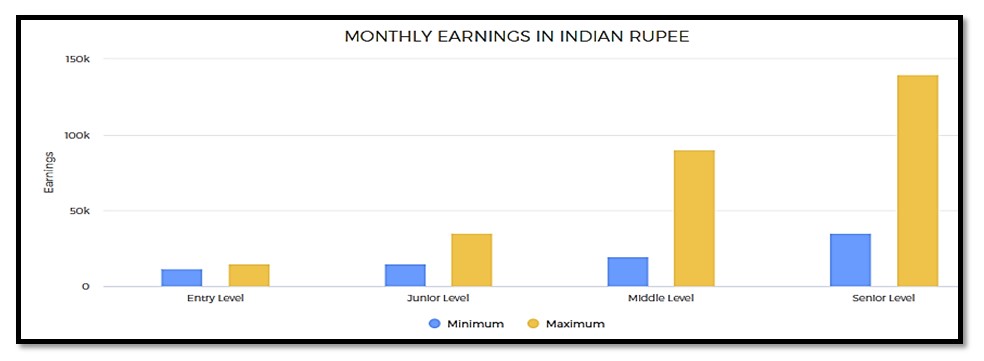
Monthly Earnings In Indian Rupee
Entry Level | Junior Level | Mid Level | Senior Level | ||||
Min Earning | Max Earning | Min Earning | Max Earning | Min Earning | Max Earning | Min Earning | Max Earning |
12000 | 15000 | 15000 | 35000 | 20000 | 90000 | 35000 | 140000 |
1. Entry level: 0 - 2 years of work experience
2. Junior Level: From 1 to 12 years of work experience
3. Mid Level: From 5 to 20+ years of work experience
4. Senior Level: From 10 to 25+ years of work experience (there could be exceptions in some high-end technical, financial, engineering, creative, management, sports, and other careers; also in the near future, people will reach these levels much faster in many careers and in some careers, these levels will have no meaning as those careers will be completely tech skill driven such as even now, there is almost no level in a Cyber Security Expert’s job)
Work Activities
1. Assisting and caring for people: Assisting people in availing of services; taking care of people in different situations; offering help and services to others.
2. Analysing and interpreting data and information: Analysis of data and information to find facts, trends, reasons behind situations, etc.; interpretation of data to aid in decision making.
3. Communicating with co-workers and others: Communicating with people in writing, verbally or otherwise inside your workplace and various other people who have professional relationships with your place of work including vendors, government officials, etc. or with people at large
4. Decision making and problem solving: Analysis of data and information; evaluation of alternative decisions and results of decisions; taking the right decisions and solving problems.
5. Developing and maintaining inter-personal relationships: Developing professional relationships with co-workers and others outside organisations and maintaining good relationships.
6. Getting Information and learning: Observing, hearing, reading, using computers, or otherwise obtaining information and learning from it.
7. Handling administrative activities: Handling various administrative tasks and managing day-to-day operations.
8. Inspecting equipment, systems, structures, and materials: Inspecting equipment, systems, structures, and materials to ascertain quality, performance, defects, causes of errors, etc.
9. Inspecting situations, events, and people: Inspecting situations, events and people to understand the reasons and causes for the situation or events to happen; inspecting people to understand reasons behind their behaviour and actions.
10. Updating and using relevant knowledge: Keeping updated with the latest knowledge relevant to your fields of work and use of the relevant knowledge in getting things done.
11. Using computers for work: Using computers for day-to-day office work; using computer software for various applications in day-to-day professional work; entering data and process information; for writing.
12. Working in a team: Working in a team of people; developing team; maintaining professional relationships among team members.
Future Prospects
1. The healthcare sector in India is one of the fastest-growing sectors and will reach to an estimate of around USD 280 billion. India has also become a one-stop destination for high-end diagnostic services and is attracting a number of capital advancements for advanced diagnostic facilities.
2. Many private and government hospitals have adopted high-end technological services catering to rising demands. Therefore a career in this allied healthcare sector would witness immense demand in the upcoming years.
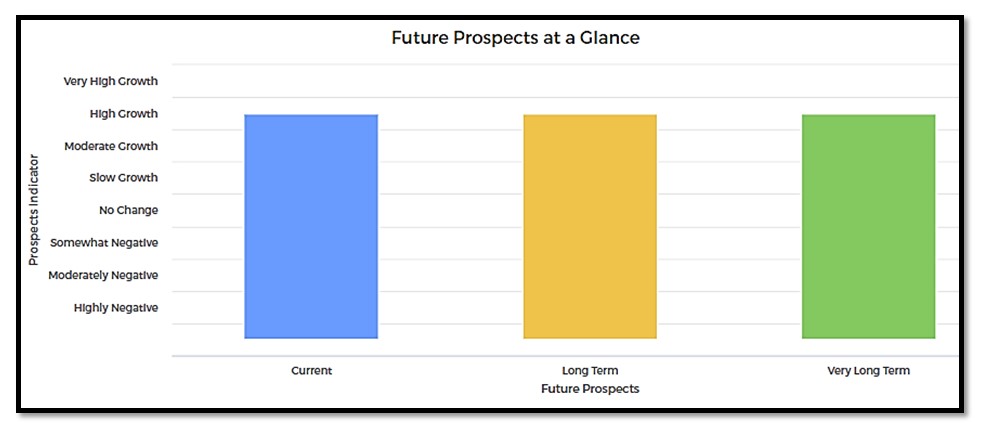
Future Prospects At A Glance
Current (0-1 year) | Long Term (2-5 year) | Very Long Term (6-10 years) |
High Growth | High Growth | High Growth |


